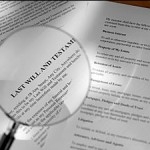Succession (Scotland) Act 201606 March 2019
Written by James & George Collie
 The Succession (Scotland) Act 2016 will come fully into force on 1st November 2016. This is the first significant reform in this area of law for over 50 years.
The Succession (Scotland) Act 2016 will come fully into force on 1st November 2016. This is the first significant reform in this area of law for over 50 years.
The 2016 Act implements a number of technical legal changes and addresses a number of anomalies within the current legal framework. This Act is likely to be the first stage in what is anticipated to be a two-stage reform of the law of Succession in Scotland. The second stage of the proposed reforms on which the Government consulted towards the end of last year could result in a far more radical and controversial overhaul of the law on Succession as we know it, including changing how an estate is distributed if an individual dies intestate, without making a Will.
The key reforms in the 2016 Act are as follows:
If your Will contains a mistake, the Act makes it possible to apply to the court within a certain period of time to have the Will rectified, but this will only be possible if the Will was prepared by someone other than you and there is evidence that the Will does not reflect what you instructed.
If you die on or after 1st November 2016 and your ex-spouse or ex-civil partner is named as a beneficiary and/or appointed as executor in your Will, then that bequest will no longer be valid unless you make it clear in your Will that this bequest is to stand.
If there is a survivorship destination, also commonly known as a special destination, in title to property held by you and your spouse or civil partner, which provides that on the death of one of the spouses or civil partners, their title automatically passes to the survivor, this will not take effect if you get divorced, your civil partnership is dissolved or your marriage is annulled.
Currently, if you have a Will and then make a new Will and then change your mind and cancel the new Will, the previous Will would revive and dictate how your estate would be distributed. The Act changes this so that the previous Will would not automatically be revived.
If you leave a legacy to a direct descendant, ie a child, grandchild or great-grandchild only, and that beneficiary predeceases you, then that beneficiary’s descendants would automatically inherit in place of the predeceasing beneficiary unless you clearly state otherwise in your Will.
If you set out a time period in your Will by which a beneficiary must survive you in order to inherit, and if it there is any uncertainty as to whether the beneficiary survives for that period, the Act introduces a new presumption that the beneficiary has not survived for the specified period.
Where a person dies without a Will, and an executor requires to be appointed by the court, an insurance policy known as Bond of Caution is normally required (although this is not always required where the executor is the surviving spouse). The Act abolishes the requirement to find Caution where the estate is classified as a “Small Estate” which is currently an estate valued at less than £36,000.
The Act gives Trustees and Executors protection where they have incorrectly distributed assets provided they have done so after making reasonable enquiries and in good faith, or in accordance with an order of the court.
Should you have any queries about how the Act may affect you, or should you wish to discuss any matter in relation to Succession or the making or updating of your Will, please contact Forbes McLennan or Vivienne Bruce.
 The Succession (Scotland) Act 2016 will come fully into force on 1st November 2016. This is the first significant reform in this area of law for over 50 years.
The Succession (Scotland) Act 2016 will come fully into force on 1st November 2016. This is the first significant reform in this area of law for over 50 years.